Unit 2 School life Integrated skills 语言点课件(共42张PPT) 牛津译林版八年级英语上册
文档属性
| 名称 | Unit 2 School life Integrated skills 语言点课件(共42张PPT) 牛津译林版八年级英语上册 |
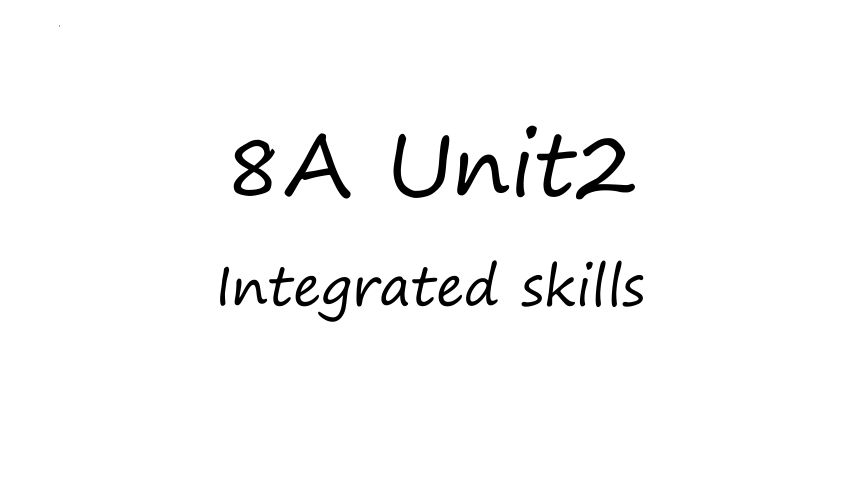
|
|
| 格式 | pptx | ||
| 文件大小 | 2.7MB | ||
| 资源类型 | 教案 | ||
| 版本资源 | 牛津译林版 | ||
| 科目 | 英语 | ||
| 更新时间 | 2024-10-08 00:00:00 | ||
图片预览

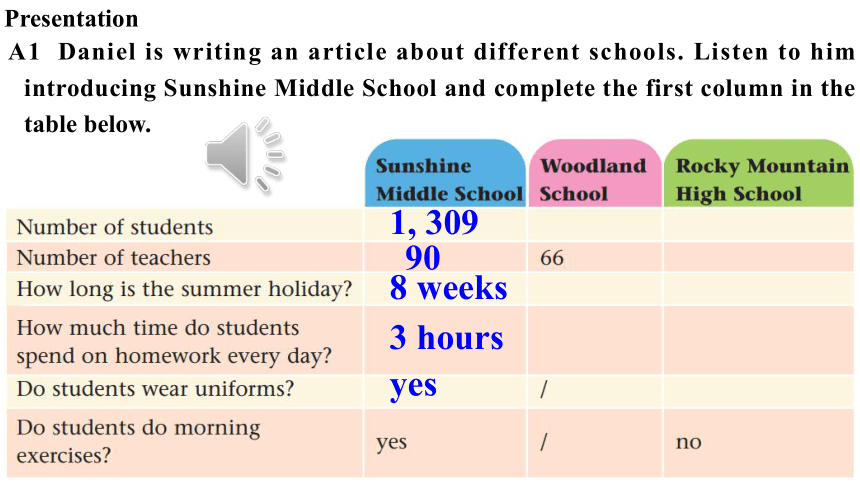

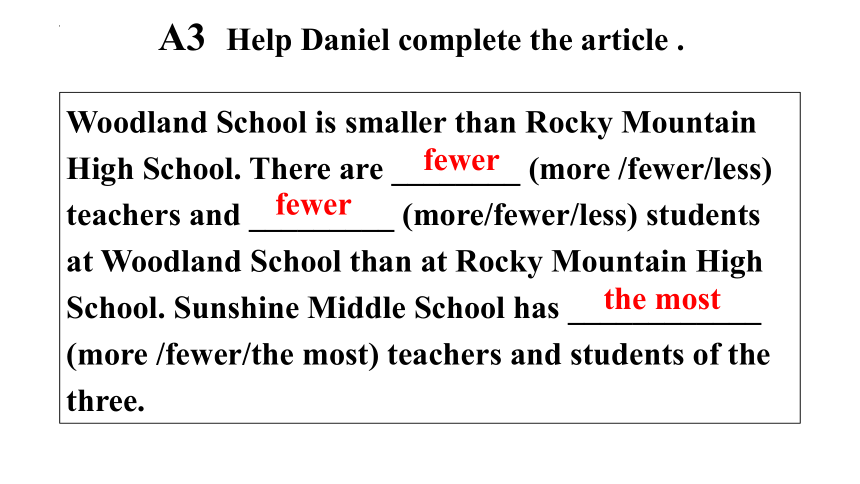
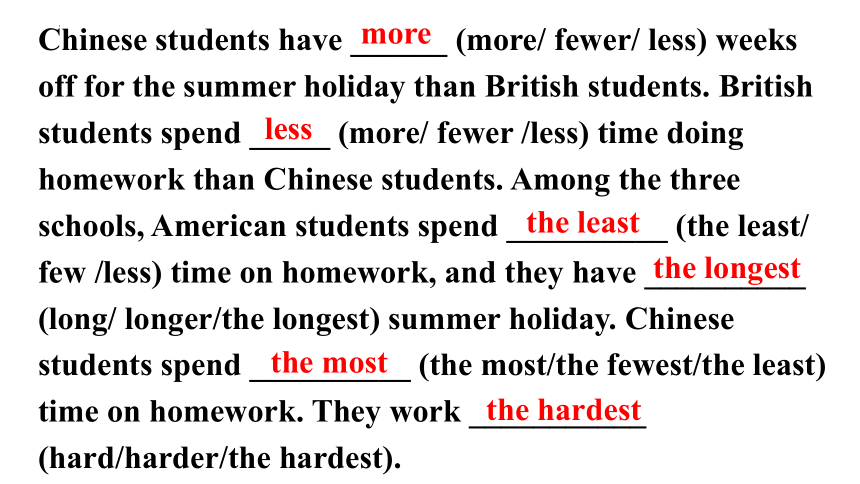
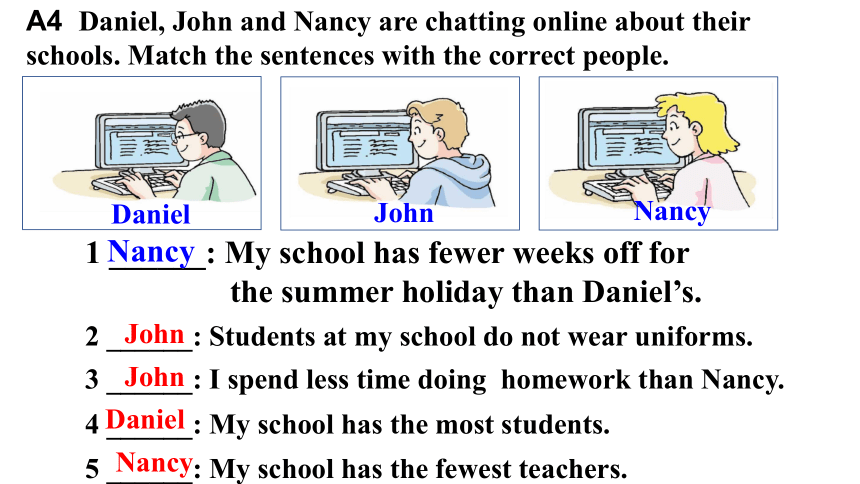
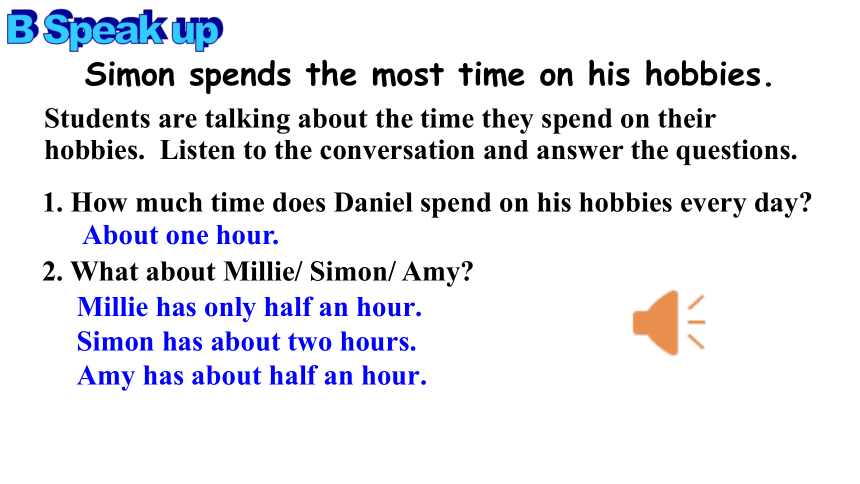
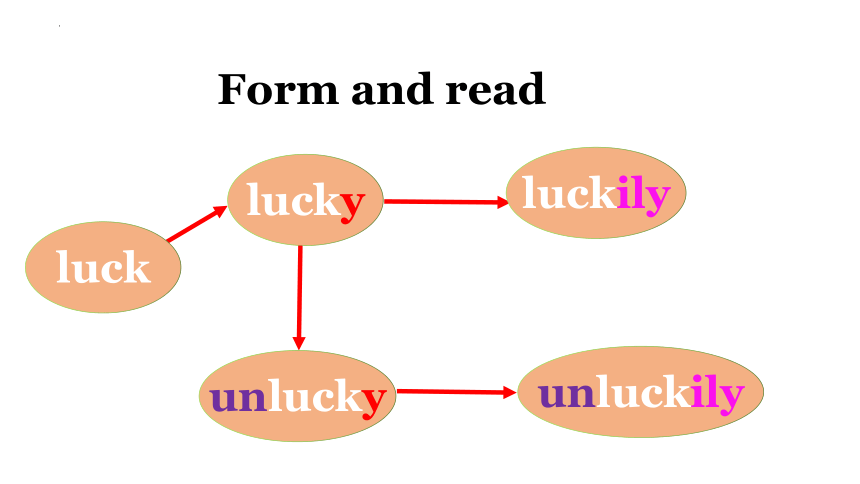
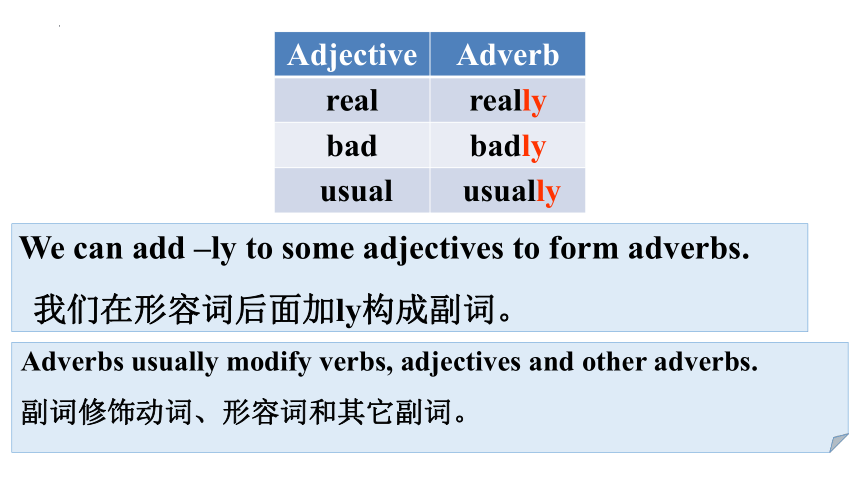
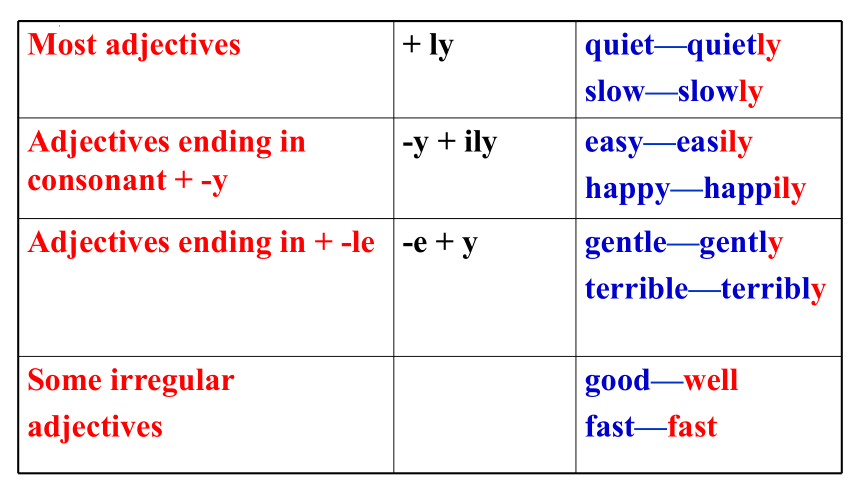
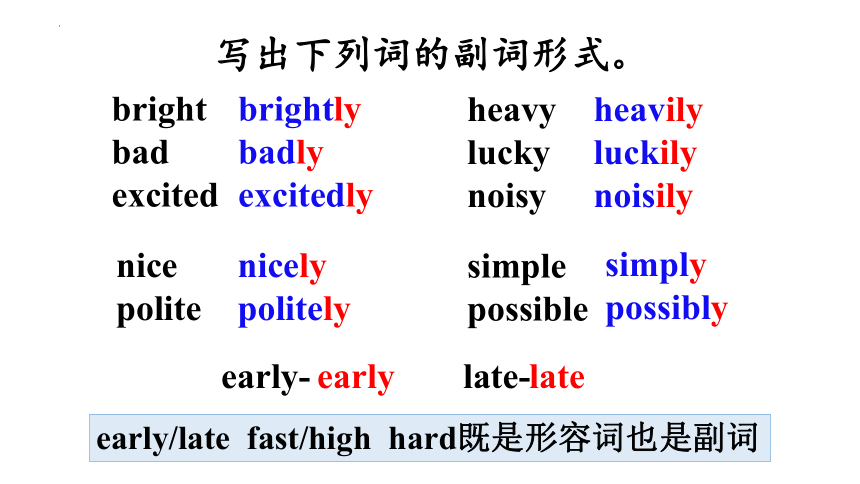

文档简介
(共42张PPT)
8A Unit2
Integrated skills
A1 Daniel is writing an article about different schools. Listen to him introducing Sunshine Middle School and complete the first column in the table below.
1, 309
90
8 weeks
3 hours
yes
Presentation
1, 309
90
8 weeks
3 hours
yes
A2 Sandy is helping Daniel collect informtion on the Internet about other schools. Listen to their conversation and complete the rest of the table.
308
2 hours
6 weeks
1215
85
12 weeks
1 hour
no
Woodland School is smaller than Rocky Mountain High School. There are ________ (more /fewer/less) teachers and _________ (more/fewer/less) students at Woodland School than at Rocky Mountain High School. Sunshine Middle School has ____________ (more /fewer/the most) teachers and students of the three.
A3 Help Daniel complete the article .
fewer
fewer
the most
Chinese students have ______ (more/ fewer/ less) weeks off for the summer holiday than British students. British students spend _____ (more/ fewer /less) time doing homework than Chinese students. Among the three schools, American students spend __________ (the least/ few /less) time on homework, and they have __________ (long/ longer/the longest) summer holiday. Chinese students spend __________ (the most/the fewest/the least) time on homework. They work ___________ (hard/harder/the hardest).
more
less
the least
the longest
the most
the hardest
A4 Daniel, John and Nancy are chatting online about their schools. Match the sentences with the correct people.
1 ______: My school has fewer weeks off for
the summer holiday than Daniel’s.
Nancy
John
Nancy
Daniel
2 ______: Students at my school do not wear uniforms.
3 ______: I spend less time doing homework than Nancy.
4 ______: My school has the most students.
5 ______: My school has the fewest teachers.
John
Daniel
Nancy
John
1. How much time does Daniel spend on his hobbies every day
2. What about Millie/ Simon/ Amy
About one hour.
Millie has only half an hour.
Simon has about two hours.
Amy has about half an hour.
Simon spends the most time on his hobbies.
Students are talking about the time they spend on their hobbies. Listen to the conversation and answer the questions.
B Speak up
lucky
luck
luckily
unlucky
unluckily
Form and read
We can add –ly to some adjectives to form adverbs.
我们在形容词后面加ly构成副词。
Adjective Adverb
real really
bad badly
usual usually
Adverbs usually modify verbs, adjectives and other adverbs.
副词修饰动词、形容词和其它副词。
Most adjectives + ly quiet—quietly
slow—slowly
Adjectives ending in consonant + -y -y + ily easy—easily
happy—happily
Adjectives ending in + -le -e + y gentle—gently
terrible—terribly
Some irregular adjectives good—well
fast—fast
bright
bad
excited
brightly
badly
excitedly
heavily
luckily
noisily
写出下列词的副词形式。
nice
polite
nicely
politely
simple
possible
simply
possibly
early- late-
heavy
lucky
noisy
early late
early/late fast/high hard既是形容词也是副词
We can also add “-ly” to some nouns to form adjectives.
在名词后面加后缀ly也可以变成形容词!
并不是所有以ly结尾的都是副词!
Nouns Adjectives
friend friendly
day daily
week weekly
友善的
慈母般的
兄弟般的
可爱的
每天的
每周的
每月的
每年的
friendly
motherly
brotherly
lovely
daily
weekly
monthly
yearly
These words are also adverbs.
A Add -ly to each of the words in the box on the left.
Then put them in different groups.
careful day
easy love
month quick
slow usual
week year
Adjective—Adverb Noun—Adjective
careful—carefully
day—daily
easy—easily
love—lovely
quick—quickly
month— monthly
slow—slowly
week—weekly
usual—usually
year—yearly
Today we had an English test. We have a ___________ (month)
test on each subject. I looked through the questions __________
(quick). I could _________ (easy) answer all of them.
To me, learning foreign language is ________ (real) fun. I read
English newspapers and magazines every day. I read very _________ (slow) at first, but I am doing better now. I also keep writing in English about my __________ (day) life. I learn to use English better this way._________ (usual) I watch English videos at weekends. I always have a ___________ (love) time!
B Millie is writing in her diary. Complete her entry with the correct forms of the words in brackets.
monthly
quickly
easily
really
slowly
daily
Usually
lovely
Phrases
1. the number of students
2. a large number of students
3. wear uniforms
4. do morning exercises
5. collect information on the Internet
6. the rest of the table
7. have eight weeks off for the summer holiday
8. spend one hour doing homework
9. spend half an hour on homework
10. play chess
11. at most
12. at least
13. do some reading
14. among the four of us
15. a weekly newspaper
16. have a monthly test on each subject
17. look through the questions quickly
18. easily answer all of the questions
19. have great fun
20. read magazines slowly at first
21. keep writing in English
22. my daily life
23. in this way
24. watch videos at weekends
25. have a lovely time
Language points
1. compare
v.
1) 比较;对比
compare A and B
compare A with / to B
2) 把…比作:
compare A to B
n.
beyond compare
/without compare
· 无与伦比
▲ comparison
n..比较;对比
2. number
n.
1) 数字= figure
a round number 整数
2) 号码
3) 数量
A large number of people applied for the job.
许多人申请了这工作。
The number of homeless people increased greatly.
无家可归者的人数急剧增加了。
a (large/small) number of 大量、少量的
the number of ……的数目
大量的
a large amount of sth.(不可数)
=a large quantity of sth.
=a large number of sth.(可数)
少量的
a small quantity of sth.
=a small amount of sth.(不可数)
=a small number of sth.(可数)
3. uniform
n. 制服;校服:
The hat is part of the school uniform. 帽子是校服的一部份。
adj. 一致的;统一的:
The walls were a uniform grey.
墙壁一律都是灰色。
▲ unify
v. 统一;使成一体:
The new leader hopes to unify the country.
新领袖希望把国家统一起来。
the task of unifying Europe
统一欧洲的大业
▲ uniformity n. 统一
▲ uniformly adv.
▲ uniformed adj. 穿制服的
4. exercise
v. 锻炼
n.
1) [U] 锻炼
vigorous / gentle exercise
剧烈的 / 平和的运动
do exercise= take exercise
do sports= play sports
2) [C] 操练 练习题
morning/eye exercises
grammar exercises 语法练习
military exercises 军事演习
5. collect v.
1) 收集;采集=gather :
collect data / evidence / information
收集资料 / 证据 / 信息
2) 收藏:
collect stamps / postcards
3) 聚集=gather/accumulate
A crowd began to collect in front of the embassy.
人群开始聚集在大使馆的前面。
Dirt had collected in the corners of the room.
房间的角落里积满了灰尘。
4) 募集=raise
collect oneself / one's thoughts (尽力)镇定下来
▲ collected adj. [只做表语]镇静;冷静:
She always stays cool, calm and collected in a crisis.
她在危急关头总是很冷静镇定,处之泰然。
▲ collection n.
1) 收藏品:
2) 作品集
a collection of stories 小说集
3) 一批物品;一群人:
There was a collection of books and shoes on the floor.
地板上有成堆的书和鞋。
4) 募捐
The total collection last week amounted to 250.
上周的募捐总额达 250 英镑。
▲ collective
adj.集体的;共有的;共同的:
collective responsibility
共同责任
▲ collectivism
n. 集体主义
6. rest
n.
1) 剩余部份;其余:
I'm not doing this job for the rest of my life.
我不会一辈子干这种工作。
2) 休息时间;睡眠时间:
I had a good night's rest.
我睡了一宿好觉。
have / take a rest from hard work
放下繁重的工作,休息一下
v.
1) 休息;放松:
The doctor told me to rest.
医生叫我休息。
2) (被)支撑;(使)倚靠
His chin rested on his hands.
=He rested his chin in his hands.
他双手托着下巴。
3) (委婉说法,与 be buried 同义)安息,长眠:
May he rest in peace.
愿他安息吧。
rest on
1) 依靠;依赖=depend on =rely on
All our hopes now rest on you.
现在所有的希望都寄托在你的身上。
2) 凝视;凝望:
Her eyes rested on the piece of paper in my hand.
她的目光落在我手里的一张纸上。
3) 以…为基础=be based on
rest with
· 是…的责任(或分内的事):
The final decision rests with the doctors.
要由医生作出最后决定。
7. off adv.& prep.
1) 离开;(在时间或空间上)距,离:
I called him but he ran off.
我喊他,可他跑开了。
I fell off the ladder.
我从梯子上跌了下来。
Keep off the grass!
勿践踏草坪!
2) 除去了某物
Take your coat off.
3) 被取消:
The wedding is off.
婚礼被取消了。
4) 未连接;不工作:
The water is off.
停水了。
5) 下班;休息:
She's off today.
她今天休假。
How many days did you take off
你休了几天假?
6) 减价的
shoes with $20 off
减价 20 元的鞋
All shirts have / are 10% off.
衬衣全部减价 10%。
7) 不新鲜;变质:
This fish has gone off.
这条鱼已变质了。
Idioms
be well / better off 生活宽裕
be badly off 经济情况不好
8. spend v.
1) 花钱
sb. spend +钱 on sth.
=sb. pay +钱 for sth.
=sth. cost sb.+钱
2) 花时间
sb. spend +时间 (in) doing sth.
=sb. spend +时间 on sth.
How long did you spend on your homework
=How long did you spend (in) doing your homework
3) 花费精力
She spends too much effort on things that don't matter.
她在一些无关紧要的事情上花费精力太多。
9. 数字 + more = another + 数字
Eg. 老师还需要十个学生搬课桌。
The teacher needs ten more students to carry the desks.
=The teacher needs another ten students to carry the desks.
10. at most
at least
no less than
· (强调数量)不少于,多达:
The guide contains details of no less than 115 hiking routes.
这本导游指南包括多达 115 条徒步旅行路线的详细介绍。
no more than
· 至多,不超过
more or less
· 几乎;差不多=almost
I've more or less finished the book. 我差不多已经读完这本书了。
what is more
· 更为重要的是
11. among
prep.
1) 在…中=in the middle of;周围是:
a house among the trees
树林中的一座房子
2)(在三者或以上)其中之一:
A British woman was among the survivors.
幸存者中有一位英国妇女。
He was among the last to leave.
他是最后离开者之一。
12. quick
adj. 迅速的=fast
have a quick temper
· 性子急;容易发脾气
(as) quick as a flash
· 极快;神速:
▲ quicken
v.(使)加快,加速
13. through prep. & adv.
1) 从…一端至另一端;穿过:
The burglar got in through the window.
盗贼是从窗户进来的。
The sand ran through (= between)my fingers.
沙子从我的手指缝间漏了下去。
The doctor pushed his way through the crowd.
医生挤过人群。
2) 透过…看到;隔着…听到:
I couldn't hear their conversation through the wall.
3) 自始至终;从头到尾:
The children are too young to sit through a concert.
这些孩子太小,音乐会没完就坐不住了。
4) 通过(障碍、阶段或测试):
Go through this gate, and you'll see the house on your left.
你穿过这道大门,就看到左面的房子了。
First I have to get through the exams.
首先我必须通过这些考试。
5) 凭借,通过:
You can only achieve success through hard work.
你得孜孜不倦方能成功。
6) (电话)接通着:
I tried to call you but I couldn't get through.
我给你打电话了,可是怎么也打不通。
throughout
prep.
1) 各处;遍及:
They export their products to markets throughout the world.
他们把产品出口到世界各地的市场。
2) 自始至终;贯穿整个时期:
The museum is open daily throughout the year.
这个博物馆一年到头每天都开放。
14. real adj.
1) 真实的;实际存在的:
It wasn't a ghost; it was a real person.
In the movies guns kill people instantly, but it's not like that in real life.
电影中,枪能使人在瞬间毙命,而实际情况并非如此。
2)真的;非人工的:
Are those real flowers
real leather 真皮
3)真正的;真实的:
Tell me the real reason.
▲ unreal adj.
▲ reality n.现实
▲ realize v.实现
15. at first 一开始,起初
=in the beginning
at last 最后=in the end =finally =eventually
16. keep v.
1) (使)保持,处于:
We huddled together to keep warm.
我们挤在一起来保暖。
The notice said 'Keep off the grass'.
牌子上写着"勿践踏草地"。
She had trouble keeping her balance.
她保持平衡有困难。
I'm very sorry to keep you waiting.
对不起,让你久等了。
2) 继续,重复(做某事):
Keep smiling!
要保持笑容!
Don't keep on interrupting me!
别老是跟我打岔!
3) 保有;留着:
I keep all her letters.
我把她所有的信都保留着。
4) 开设,经营(商店或餐馆):
Her father kept a grocer's shop.
她父亲开了个杂货店。
5) 饲养:
keep bees / goats / hens
养蜜蜂 / 山羊 / 母鸡
6) 保守(秘密):
Can you keep a secret 你能保守秘密吗?
7) 遵守:
She kept her promise to visit them.
她遵守诺言去看望了他们。
He failed to keep his appointment at the clinic.
他未能按预约的时间去诊所。
8) 记下,记录(日记、账目、记录等):
She kept a diary for over twenty years.
她记了二十多年的日记。
9) 保护;使免受:
keep sb. from sth.= protect sb. from sth.
His only thought was to keep the boy from harm.
他一心想的就是不要让这男孩受到伤害。
8A Unit2
Integrated skills
A1 Daniel is writing an article about different schools. Listen to him introducing Sunshine Middle School and complete the first column in the table below.
1, 309
90
8 weeks
3 hours
yes
Presentation
1, 309
90
8 weeks
3 hours
yes
A2 Sandy is helping Daniel collect informtion on the Internet about other schools. Listen to their conversation and complete the rest of the table.
308
2 hours
6 weeks
1215
85
12 weeks
1 hour
no
Woodland School is smaller than Rocky Mountain High School. There are ________ (more /fewer/less) teachers and _________ (more/fewer/less) students at Woodland School than at Rocky Mountain High School. Sunshine Middle School has ____________ (more /fewer/the most) teachers and students of the three.
A3 Help Daniel complete the article .
fewer
fewer
the most
Chinese students have ______ (more/ fewer/ less) weeks off for the summer holiday than British students. British students spend _____ (more/ fewer /less) time doing homework than Chinese students. Among the three schools, American students spend __________ (the least/ few /less) time on homework, and they have __________ (long/ longer/the longest) summer holiday. Chinese students spend __________ (the most/the fewest/the least) time on homework. They work ___________ (hard/harder/the hardest).
more
less
the least
the longest
the most
the hardest
A4 Daniel, John and Nancy are chatting online about their schools. Match the sentences with the correct people.
1 ______: My school has fewer weeks off for
the summer holiday than Daniel’s.
Nancy
John
Nancy
Daniel
2 ______: Students at my school do not wear uniforms.
3 ______: I spend less time doing homework than Nancy.
4 ______: My school has the most students.
5 ______: My school has the fewest teachers.
John
Daniel
Nancy
John
1. How much time does Daniel spend on his hobbies every day
2. What about Millie/ Simon/ Amy
About one hour.
Millie has only half an hour.
Simon has about two hours.
Amy has about half an hour.
Simon spends the most time on his hobbies.
Students are talking about the time they spend on their hobbies. Listen to the conversation and answer the questions.
B Speak up
lucky
luck
luckily
unlucky
unluckily
Form and read
We can add –ly to some adjectives to form adverbs.
我们在形容词后面加ly构成副词。
Adjective Adverb
real really
bad badly
usual usually
Adverbs usually modify verbs, adjectives and other adverbs.
副词修饰动词、形容词和其它副词。
Most adjectives + ly quiet—quietly
slow—slowly
Adjectives ending in consonant + -y -y + ily easy—easily
happy—happily
Adjectives ending in + -le -e + y gentle—gently
terrible—terribly
Some irregular adjectives good—well
fast—fast
bright
bad
excited
brightly
badly
excitedly
heavily
luckily
noisily
写出下列词的副词形式。
nice
polite
nicely
politely
simple
possible
simply
possibly
early- late-
heavy
lucky
noisy
early late
early/late fast/high hard既是形容词也是副词
We can also add “-ly” to some nouns to form adjectives.
在名词后面加后缀ly也可以变成形容词!
并不是所有以ly结尾的都是副词!
Nouns Adjectives
friend friendly
day daily
week weekly
友善的
慈母般的
兄弟般的
可爱的
每天的
每周的
每月的
每年的
friendly
motherly
brotherly
lovely
daily
weekly
monthly
yearly
These words are also adverbs.
A Add -ly to each of the words in the box on the left.
Then put them in different groups.
careful day
easy love
month quick
slow usual
week year
Adjective—Adverb Noun—Adjective
careful—carefully
day—daily
easy—easily
love—lovely
quick—quickly
month— monthly
slow—slowly
week—weekly
usual—usually
year—yearly
Today we had an English test. We have a ___________ (month)
test on each subject. I looked through the questions __________
(quick). I could _________ (easy) answer all of them.
To me, learning foreign language is ________ (real) fun. I read
English newspapers and magazines every day. I read very _________ (slow) at first, but I am doing better now. I also keep writing in English about my __________ (day) life. I learn to use English better this way._________ (usual) I watch English videos at weekends. I always have a ___________ (love) time!
B Millie is writing in her diary. Complete her entry with the correct forms of the words in brackets.
monthly
quickly
easily
really
slowly
daily
Usually
lovely
Phrases
1. the number of students
2. a large number of students
3. wear uniforms
4. do morning exercises
5. collect information on the Internet
6. the rest of the table
7. have eight weeks off for the summer holiday
8. spend one hour doing homework
9. spend half an hour on homework
10. play chess
11. at most
12. at least
13. do some reading
14. among the four of us
15. a weekly newspaper
16. have a monthly test on each subject
17. look through the questions quickly
18. easily answer all of the questions
19. have great fun
20. read magazines slowly at first
21. keep writing in English
22. my daily life
23. in this way
24. watch videos at weekends
25. have a lovely time
Language points
1. compare
v.
1) 比较;对比
compare A and B
compare A with / to B
2) 把…比作:
compare A to B
n.
beyond compare
/without compare
· 无与伦比
▲ comparison
n..比较;对比
2. number
n.
1) 数字= figure
a round number 整数
2) 号码
3) 数量
A large number of people applied for the job.
许多人申请了这工作。
The number of homeless people increased greatly.
无家可归者的人数急剧增加了。
a (large/small) number of 大量、少量的
the number of ……的数目
大量的
a large amount of sth.(不可数)
=a large quantity of sth.
=a large number of sth.(可数)
少量的
a small quantity of sth.
=a small amount of sth.(不可数)
=a small number of sth.(可数)
3. uniform
n. 制服;校服:
The hat is part of the school uniform. 帽子是校服的一部份。
adj. 一致的;统一的:
The walls were a uniform grey.
墙壁一律都是灰色。
▲ unify
v. 统一;使成一体:
The new leader hopes to unify the country.
新领袖希望把国家统一起来。
the task of unifying Europe
统一欧洲的大业
▲ uniformity n. 统一
▲ uniformly adv.
▲ uniformed adj. 穿制服的
4. exercise
v. 锻炼
n.
1) [U] 锻炼
vigorous / gentle exercise
剧烈的 / 平和的运动
do exercise= take exercise
do sports= play sports
2) [C] 操练 练习题
morning/eye exercises
grammar exercises 语法练习
military exercises 军事演习
5. collect v.
1) 收集;采集=gather :
collect data / evidence / information
收集资料 / 证据 / 信息
2) 收藏:
collect stamps / postcards
3) 聚集=gather/accumulate
A crowd began to collect in front of the embassy.
人群开始聚集在大使馆的前面。
Dirt had collected in the corners of the room.
房间的角落里积满了灰尘。
4) 募集=raise
collect oneself / one's thoughts (尽力)镇定下来
▲ collected adj. [只做表语]镇静;冷静:
She always stays cool, calm and collected in a crisis.
她在危急关头总是很冷静镇定,处之泰然。
▲ collection n.
1) 收藏品:
2) 作品集
a collection of stories 小说集
3) 一批物品;一群人:
There was a collection of books and shoes on the floor.
地板上有成堆的书和鞋。
4) 募捐
The total collection last week amounted to 250.
上周的募捐总额达 250 英镑。
▲ collective
adj.集体的;共有的;共同的:
collective responsibility
共同责任
▲ collectivism
n. 集体主义
6. rest
n.
1) 剩余部份;其余:
I'm not doing this job for the rest of my life.
我不会一辈子干这种工作。
2) 休息时间;睡眠时间:
I had a good night's rest.
我睡了一宿好觉。
have / take a rest from hard work
放下繁重的工作,休息一下
v.
1) 休息;放松:
The doctor told me to rest.
医生叫我休息。
2) (被)支撑;(使)倚靠
His chin rested on his hands.
=He rested his chin in his hands.
他双手托着下巴。
3) (委婉说法,与 be buried 同义)安息,长眠:
May he rest in peace.
愿他安息吧。
rest on
1) 依靠;依赖=depend on =rely on
All our hopes now rest on you.
现在所有的希望都寄托在你的身上。
2) 凝视;凝望:
Her eyes rested on the piece of paper in my hand.
她的目光落在我手里的一张纸上。
3) 以…为基础=be based on
rest with
· 是…的责任(或分内的事):
The final decision rests with the doctors.
要由医生作出最后决定。
7. off adv.& prep.
1) 离开;(在时间或空间上)距,离:
I called him but he ran off.
我喊他,可他跑开了。
I fell off the ladder.
我从梯子上跌了下来。
Keep off the grass!
勿践踏草坪!
2) 除去了某物
Take your coat off.
3) 被取消:
The wedding is off.
婚礼被取消了。
4) 未连接;不工作:
The water is off.
停水了。
5) 下班;休息:
She's off today.
她今天休假。
How many days did you take off
你休了几天假?
6) 减价的
shoes with $20 off
减价 20 元的鞋
All shirts have / are 10% off.
衬衣全部减价 10%。
7) 不新鲜;变质:
This fish has gone off.
这条鱼已变质了。
Idioms
be well / better off 生活宽裕
be badly off 经济情况不好
8. spend v.
1) 花钱
sb. spend +钱 on sth.
=sb. pay +钱 for sth.
=sth. cost sb.+钱
2) 花时间
sb. spend +时间 (in) doing sth.
=sb. spend +时间 on sth.
How long did you spend on your homework
=How long did you spend (in) doing your homework
3) 花费精力
She spends too much effort on things that don't matter.
她在一些无关紧要的事情上花费精力太多。
9. 数字 + more = another + 数字
Eg. 老师还需要十个学生搬课桌。
The teacher needs ten more students to carry the desks.
=The teacher needs another ten students to carry the desks.
10. at most
at least
no less than
· (强调数量)不少于,多达:
The guide contains details of no less than 115 hiking routes.
这本导游指南包括多达 115 条徒步旅行路线的详细介绍。
no more than
· 至多,不超过
more or less
· 几乎;差不多=almost
I've more or less finished the book. 我差不多已经读完这本书了。
what is more
· 更为重要的是
11. among
prep.
1) 在…中=in the middle of;周围是:
a house among the trees
树林中的一座房子
2)(在三者或以上)其中之一:
A British woman was among the survivors.
幸存者中有一位英国妇女。
He was among the last to leave.
他是最后离开者之一。
12. quick
adj. 迅速的=fast
have a quick temper
· 性子急;容易发脾气
(as) quick as a flash
· 极快;神速:
▲ quicken
v.(使)加快,加速
13. through prep. & adv.
1) 从…一端至另一端;穿过:
The burglar got in through the window.
盗贼是从窗户进来的。
The sand ran through (= between)my fingers.
沙子从我的手指缝间漏了下去。
The doctor pushed his way through the crowd.
医生挤过人群。
2) 透过…看到;隔着…听到:
I couldn't hear their conversation through the wall.
3) 自始至终;从头到尾:
The children are too young to sit through a concert.
这些孩子太小,音乐会没完就坐不住了。
4) 通过(障碍、阶段或测试):
Go through this gate, and you'll see the house on your left.
你穿过这道大门,就看到左面的房子了。
First I have to get through the exams.
首先我必须通过这些考试。
5) 凭借,通过:
You can only achieve success through hard work.
你得孜孜不倦方能成功。
6) (电话)接通着:
I tried to call you but I couldn't get through.
我给你打电话了,可是怎么也打不通。
throughout
prep.
1) 各处;遍及:
They export their products to markets throughout the world.
他们把产品出口到世界各地的市场。
2) 自始至终;贯穿整个时期:
The museum is open daily throughout the year.
这个博物馆一年到头每天都开放。
14. real adj.
1) 真实的;实际存在的:
It wasn't a ghost; it was a real person.
In the movies guns kill people instantly, but it's not like that in real life.
电影中,枪能使人在瞬间毙命,而实际情况并非如此。
2)真的;非人工的:
Are those real flowers
real leather 真皮
3)真正的;真实的:
Tell me the real reason.
▲ unreal adj.
▲ reality n.现实
▲ realize v.实现
15. at first 一开始,起初
=in the beginning
at last 最后=in the end =finally =eventually
16. keep v.
1) (使)保持,处于:
We huddled together to keep warm.
我们挤在一起来保暖。
The notice said 'Keep off the grass'.
牌子上写着"勿践踏草地"。
She had trouble keeping her balance.
她保持平衡有困难。
I'm very sorry to keep you waiting.
对不起,让你久等了。
2) 继续,重复(做某事):
Keep smiling!
要保持笑容!
Don't keep on interrupting me!
别老是跟我打岔!
3) 保有;留着:
I keep all her letters.
我把她所有的信都保留着。
4) 开设,经营(商店或餐馆):
Her father kept a grocer's shop.
她父亲开了个杂货店。
5) 饲养:
keep bees / goats / hens
养蜜蜂 / 山羊 / 母鸡
6) 保守(秘密):
Can you keep a secret 你能保守秘密吗?
7) 遵守:
She kept her promise to visit them.
她遵守诺言去看望了他们。
He failed to keep his appointment at the clinic.
他未能按预约的时间去诊所。
8) 记下,记录(日记、账目、记录等):
She kept a diary for over twenty years.
她记了二十多年的日记。
9) 保护;使免受:
keep sb. from sth.= protect sb. from sth.
His only thought was to keep the boy from harm.
他一心想的就是不要让这男孩受到伤害。
